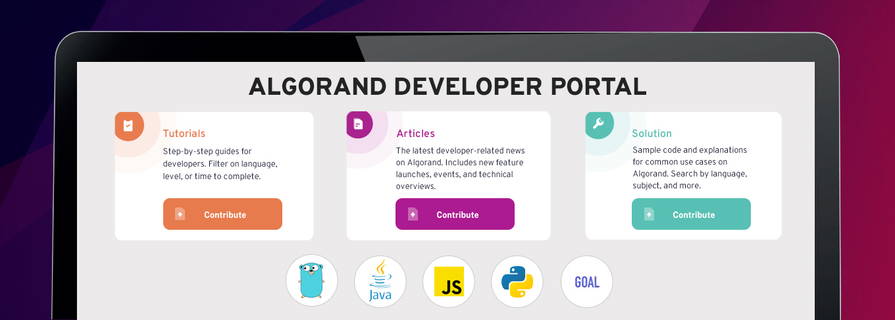ORE ID
Showing 183 posts related with ORE ID.
-
 Beginner · 1 hour
Beginner · 1 hourStateless session management with the Pera wallet
Leveraging Wallet Connect, NextJs and Redux to securely login users.
-
 Intermediate · 1 hour
Intermediate · 1 hourParticipate in Consensus from Ledger Nano S/X
In this tutorial, we show how to participate in consensus from an account stored in a Ledger Nano S or X. By participating in consensus, you help decentralize the network.
-

Welcome to the Algorand Developer Portal
The new Algorand Developer Portal provides resources for developers to turn their ideas into full-scale applications. Browse and search across new content, like Tutorials and Solutions. Access technical documentation. Stay up-to-date on the latest features.
-

Contribute to the Algorand Community and Earn Rewards
Last week we launched our new Developer Portal, with significant improvements to how developers can learn to use and implement applications on the Algorand blockchain. We are looking for developers to help us expand the content on this site, and the Algorand Foundation is rewarding those who do!
-

Contribute to the Algorand Developer Docs
The official Algorand Developer Documentation repository is now public and open to contributions. Read the contributing guide to get started.
-

Leased Transactions: Securing Advanced Smart Contract Design
Certain smart contracts can benefit from defining a Lease parameter, which can provide security for exclusive transaction execution, mitigate fee variability, and enable long-running smart contracts. Learn when and how to use Leases in this article.
-

Stateful Smart Contracts, Rekeying, and Fast Catchup
Stateful Smart Contracts, Rekeying, and Fast Catchup are brand new features that are now available to try on BetaNet. Learn more about what these features are and how to get started.
-

Introducing Sandbox 2.0
Algorand Sandbox 2.0 is focused on developers and now deploys a containerized private network with an indexer by default. All APIs are exposed to localhost; sending and searching for transaction has never been easier.
-

Intro to Algorand Studio & Algorand VS Code Extension
This article introduces two developer tools by Obsidian Labs. The first is their Algorand Studio project and the second is their VS Code Extension. Both tools are used to work with Algorand and make building and testing transactions and smart contracts easier. Additionally, both can be used to run an Algorand node.
-

Make a “.algo” name for yourself with NFDomains
NFD provides short, readable aliases for wallet addresses using NFT ASAs for .algo names.
-

Meet the Winners: Schelling Point Virtual Hackathon 2022
Meet the winners of the Gitcoin hackathon focused on DeFi apps, developer tooling, and DAO projects.
-

Prove your Skills with Algorand Code Challenges
The Algorand Developer Portal has a new way to learn how to become an Algorand developer: Challenges.
-

Reaching new transaction speeds on Algorand
Introducing 3.3s transaction finality
-

print("Algokit v2, happy technology")
With AlgoKit 2.0 we are bringing native Python to blockchain development, giving the millions of Python developers an easy onramp to the world of decentralized computing.
-

That Conference
THAT Conference is unlike any other technical conference. This unique four-day summer camp is full of workshops, sessions, open spaces, family events, and networking, all nestled in the gorgeous Kalahari Resort and Waterpark. This family-friendly event is comprised of professional and family tracks, so there is something to learn and experience at all ages. As a Camper, you receive up to 4 days of 200 professional sessions across various technologies, platforms, and disciplines of all levels. You can also access over 10,000 sq. ft. of open spaces to participate in more intimate discussions across all topics you and your fellow attendees generated. All sessions, including open spaces, are designed to build your road to level up your skills, career and take charge of you. Each day starts with an inspiring keynote, breakfast, and beverages. Then you’re off on your camping adventure to join in the many professional sessions, share your ideas and experiences in a welcoming open space, and/or learn how to solder in our Maker space. Lunch is served midday and a special social event wraps up each afternoon to encourage networking and continued learning.
-
 Intermediate · 30 minutes
Intermediate · 30 minutesAlgorand Blockchain Development using Reach - Part 6: Looping to Determine the Winner
In this tutorial, we explore loops in Reach. As dApp developers must take special care when performing loops within a consensus network. Thankfully, the Reach verification engine assures we write safe dApps.
-
 Intermediate · 30 minutes
Intermediate · 30 minutesIndexer For Blockchain Analysis
This tutorial goes over a few examples of using the 'indexer' to calculate Algorand blockchain metrics.
-

From Algos to ASAs
This guide maps core technical concepts related to the Algo to Algorand Standard Assets, which is Algorand's Layer-1 implementation for third-party fungible and non-fungible tokens.